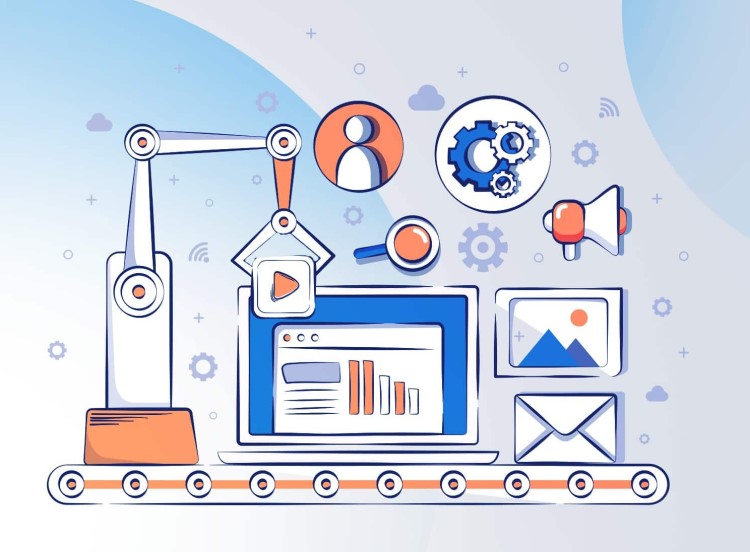 Welcome to the dynamic world of AI for business process automation, where technology meets efficiency to transform business. If you aim to streamline operations and boost productivity, it’s essential to understand how AI can automate routine tasks. This article explores the fundamentals of AI in business processes. It outlines how AI can improve accuracy, reduce costs, and boost operational efficiency. We’ll explore various AI technologies, their real-world applications across industries, and strategies to overcome implementation challenges. The insights below will equip you with the knowledge to effectively harness AI’s potential.
Welcome to the dynamic world of AI for business process automation, where technology meets efficiency to transform business. If you aim to streamline operations and boost productivity, it’s essential to understand how AI can automate routine tasks. This article explores the fundamentals of AI in business processes. It outlines how AI can improve accuracy, reduce costs, and boost operational efficiency. We’ll explore various AI technologies, their real-world applications across industries, and strategies to overcome implementation challenges. The insights below will equip you with the knowledge to effectively harness AI’s potential.
Overview of AI in Automation
Artificial intelligence (AI) is revolutionizing business operations by enabling advanced automation of complex processes. AI for business process automation uses technologies to perform tasks usually requiring human intervention. This includes data entry, decision-making, and customer service interactions. This shift not only boosts efficiency but also improves task accuracy.
One key benefit of AI in business processes is the dramatic increase in speed and error reduction. AI systems can analyze large data volumes much faster than humans, allowing quicker decisions and faster response times. AI also minimizes human error, ensuring tasks are done right the first time.
Furthermore, AI automation can save businesses money. By automating routine and time-consuming tasks, companies can cut labor costs and shift resources to strategic initiatives that drive growth. AI offers scalability that manual processes can’t match, enabling businesses to adjust operations swiftly to meet market changes or business needs.
As you consider AI for business process automation, think about how to tailor these technologies to your specific needs and goals. The potential for transforming productivity and efficiency with AI is significant, making it a crucial element of any modern business strategy.
AI Technologies Driving Automation
Several AI technologies are critical to the advancement of business process automation, each offering unique capabilities that enhance how businesses operate. Machine learning, natural language processing (NLP), and robotic process automation (RPA) stand out as key drivers in this field.
Machine learning is at the heart of predictive analytics, allowing systems to learn from past data and make informed predictions about future trends and behaviors. This technology is crucial for areas like customer service, where AI can predict customer inquiries and automate responses or in inventory management to forecast demand.
Natural language processing empowers computers to understand and interact with human language, making it a fundamental technology for customer-facing applications. NLP enables chatbots and virtual assistants to handle inquiries and provide information, simulating a human-like interaction and improving customer experience.
Robotic process automation, on the other hand, is particularly effective for tasks that are repetitive and rule-based. RPA robots mimic the way humans interact with software applications to process transactions, manipulate data, and send responses. By automating these tasks, businesses can allocate human resources to more complex problems, thus increasing workplace productivity.
These AI technologies collectively enhance AI for business process automation by making systems smarter, processes faster, and customer interactions smoother. As you integrate these technologies, they not only streamline operations but also offer significant improvements in accuracy and customer satisfaction. For businesses looking to remain competitive, understanding and applying these AI technologies is essential.
Case Studies of AI Automation in Industries
Industries across the board are leveraging AI for business process automation, each finding unique applications that enhance efficiency and outcomes. Here are a few examples illustrating how AI is transforming operations in finance, healthcare, and manufacturing.
In the finance industry, AI is revolutionizing the way institutions handle data analysis and customer service. Banks use machine learning algorithms to detect fraudulent transactions in real-time, a task that once took days. AI-driven chatbots and virtual assistants are also increasingly common, handling everything from customer inquiries to basic account operations, reducing wait times and freeing human employees for more complex issues.
Healthcare has seen transformative effects from AI as well. Hospitals are deploying AI systems to manage patient data, schedule appointments, and even assist in diagnostic processes. For example, AI algorithms analyze medical imaging faster and often more accurately than human counterparts, leading to quicker diagnoses and treatment plans. Automation extends to patient monitoring as well, where AI systems track vital signs and alert staff to urgent changes in patient conditions.
In manufacturing, AI-driven robots are now integral to the assembly line, where they perform tasks with precision and without fatigue. Beyond physical tasks, AI systems optimize production planning and predict maintenance needs for equipment, reducing downtime and operational costs. This integration of AI ensures continuous improvement in production processes, quality control, and supply chain management.
These case studies illustrate the pervasive impact of AI in automating and refining business processes. As AI technology advances, its potential to further enhance productivity and innovation in various industries continues to grow.
Challenges and Solutions in AI Automation
Integrating AI into business processes is not without its challenges. Concerns such as data privacy, high initial costs, and resistance to change are common, but there are effective strategies to address these issues and successfully implement AI for business process automation.
Data privacy is a critical concern, as AI systems often require access to vast amounts of sensitive information. To protect your data, implement strong encryption protocols and access controls. Also, ensure compliance with all relevant data protection regulations such as GDPR or CCPA, depending on your geographic and operational scope. Educating your team about data ethics and conducting regular security audits can further safeguard your information.
The initial costs of AI integration can be daunting. However, you can mitigate these expenses by starting small with pilot projects to demonstrate ROI before scaling up. This approach allows you to manage costs effectively while building the case for wider implementation across your business operations. Additionally, consider leveraging cloud-based AI solutions which can reduce upfront investments in infrastructure.
Resistance to change is another significant barrier. This can be overcome by fostering an inclusive culture that values innovation. Involve employees early in the decision-making process, and offer training to enhance their AI literacy. By demonstrating how AI can make their jobs easier and more efficient, you can turn skepticism into advocacy.
By addressing these challenges head-on with strategic planning and a focus on long-term benefits, you can pave the way for successful AI integration, enhancing productivity and competitiveness through AI for business process automation.
Impact of AI Automation on Employment
The integration of AI for business process automation has profound implications for the workforce, influencing job dynamics across various sectors. While it is true that AI can lead to job displacement by automating routine tasks, it also creates new opportunities that were not previously possible without this technology.
AI-driven automation can streamline processes in manufacturing, customer service, and data analysis, potentially reducing the need for human intervention in these areas. This shift can be unsettling, but it’s important for you to view these changes as an evolution rather than a loss. Training and education programs can re-skill affected employees, providing them with the tools needed to thrive in a more automated environment. This approach not only minimizes job displacement but also enhances job satisfaction and productivity.
Conversely, AI opens up new job opportunities in fields like AI maintenance, programming, and system management, which require specialized skills. The demand for AI specialists in machine learning, data science, and application development is rising sharply, presenting substantial career opportunities. Furthermore, AI can enable employees to focus on more strategic and creative tasks, adding value to their roles and personal job enrichment.
By understanding and adapting to these changes, businesses can ensure that the impact of AI on employment is positive, driving innovation and efficiency while also caring for their workforce.
Future Trends in AI and Automation
The trajectory of AI in business process automation is promising and full of potential. As AI technology evolves, it’s set to deepen its impact, bringing more sophisticated solutions that will further transform business operations. Key trends such as the increasing integration of AI with the Internet of Things (IoT), the rise of autonomous decision-making systems, and improvements in natural language processing will drive significant changes.
The convergence of AI and IoT means that more devices will have the ability to collect data, analyze it, and act upon insights without human intervention. This fusion can lead to smarter business operations in industries like manufacturing and logistics, where predictive maintenance and enhanced supply chain management can become the norm.
Additionally, autonomous decision-making systems are poised to take AI for business process automation to new heights. These systems can make real-time decisions based on data they analyze, greatly speeding up business processes and reducing the possibility for human error. For instance, in the finance sector, such systems can approve loans and detect fraud more efficiently than ever before.
Natural language processing is another area where significant advances are expected. As these systems become more adept at understanding and generating human language, customer service and support can be revolutionized. This will allow for more natural interactions with customers through chatbots and virtual assistants, enhancing customer satisfaction and engagement.
As these trends unfold, the potential for AI to automate more complex and creative tasks will grow, reinforcing its role as a critical asset in driving business efficiency and innovation.
Conclusion
The role of AI in business process automation is transformative across various sectors. Its integration enhances operational efficiency and accuracy while driving innovation. This allows you to remain competitive in a rapidly evolving business environment. As you move forward, think about how you can strategically implement AI within your operations. This approach will help you solve complex problems and add significant value. Remember, the journey towards effective automation involves continuous learning and adaptation. By embracing AI, you are not just adopting new technology but also paving the way for future growth and success. Stay informed, be proactive, and leverage AI to redefine your business processes.


